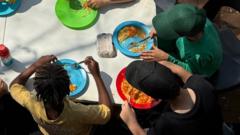How Are South African Campaigners Tackling Childhood Obesity Through Healthy Food Initiatives?

Published: 2025-09-10 13:00:41 | Category: world
The rising rates of childhood obesity in South Africa have prompted schools like Kairos School of Inquiry to adopt healthier eating policies. By prioritising vegetarian meals and encouraging whole foods in lunchboxes, they aim to combat the alarming trend of overweight children, which has doubled globally in recent years. This initiative highlights the link between unhealthy diets and the environment that shapes children's food choices.
Last updated: 27 October 2023 (BST)
Understanding the Childhood Obesity Epidemic in South Africa
Childhood obesity is a growing concern worldwide, and South Africa is no exception. The country has seen a dramatic increase in overweight children, prompting educational institutions to take proactive measures. Understanding the factors contributing to this epidemic is crucial for developing effective solutions.
Key Takeaways
- South Africa faces a significant increase in childhood obesity rates.
- Schools are adopting healthier food policies to combat this trend.
- Unhealthy marketing and easy access to junk food contribute to poor dietary choices.
- Government policies are being implemented but require further action.
- Community and individual efforts play a vital role in promoting healthy eating.
The Global Context of Childhood Obesity
According to the United Nations, the number of overweight and obese teenagers globally has nearly tripled in the last two decades. The statistics are alarming, with the number of overweight children aged five to nine years increasing from 69 million to 147 million. This trend is particularly pronounced in South Africa, where nearly 22% of children under five are classified as overweight or obese.
South Africa's Unique Challenges
South Africa is one of the worst-affected countries regarding childhood obesity. The issue often begins early; research indicates that around 80% of baby foods available in the market are high in sugar. Children are frequently exposed to aggressive marketing of unhealthy products, making it challenging for parents to promote healthy eating habits.
The Role of Schools in Promoting Healthy Eating
In an effort to combat the rising obesity rates, many schools in South Africa, including Kairos School of Inquiry, have adopted a mainly vegetarian food policy. This initiative aims to educate students about nutrition and encourage them to make healthier food choices.
Implementing Healthier Food Policies
Headteacher Marc Loon has been a strong advocate for this change, believing that schools should play a pivotal role in shaping children's eating habits. He asserts that if all schools were to adopt a thoughtful approach to nutrition, children's health would significantly improve.
Parental Influence and Community Efforts
At Kairos, parents have been urged to pack only whole foods in their children's lunchboxes. This collective effort underscores the importance of community involvement in fostering a healthy environment for children. The shift from convenience to nutritious meals requires cooperation among parents, schools, and local governments.
Challenges Faced by Parents
Parents like Memory Padi highlight the difficulties they face in maintaining healthy diets for their children. Her daughter, Sophia, diagnosed with a rare autoimmune disease, struggles with weight despite maintaining a normal diet. Padi's situation exemplifies the broader societal challenges, where unhealthy food options are often more accessible and affordable than nutritious alternatives.
The Impact of Fast Food Culture
The proliferation of fast food chains in South Africa has exacerbated the obesity crisis. In 2018, the South African fast food market was valued at £2 billion and is projected to reach £4.9 billion by 2026. This growth indicates a cultural shift towards convenience food, which, while appealing, poses significant health risks.
Personal Stories: The Reality of Fast Food Choices
Personal narratives, such as that of trainee lawyer Mamkhabela Mthembu, reveal how childhood experiences influence lifelong eating habits. Growing up in a household where junk food was a rare treat, Mthembu now faces health challenges stemming from her reliance on convenience foods during her university years.
Government Initiatives and Policy Changes
In response to the rising obesity rates, the South African government has implemented higher taxes on sugary drinks. However, these measures have yet to yield significant results. Unicef has indicated that more comprehensive strategies are necessary to combat childhood obesity effectively.
Proposed Policies for a Healthier Future
The South African health ministry plans to introduce front-of-pack nutrition labelling (FOPL) to tackle the issue of excessive sugar, fat, and salt in foods marketed to children. This initiative aims to restrict unhealthy marketing practices, providing parents with clearer information about the foods their children consume.
Community and Individual Initiatives
In addition to government policies, community-driven efforts play a crucial role in promoting healthy eating. Schools, local organisations, and parents must work together to create an environment conducive to healthy lifestyles. Initiatives like cooking classes, nutritional workshops, and community gardens can empower families to make informed dietary choices.
Encouraging a Culture of Healthy Eating
As seen in the Kairos School, making healthy food choices can be both educational and enjoyable for children. By involving students in the process of preparing and understanding food, schools can instil a sense of responsibility towards their health.
What’s Next for South Africa?
As the statistics on childhood obesity continue to rise, the need for immediate and sustained action is imperative. Both government and community initiatives must align to create a robust framework for promoting healthy eating among children.
Looking Towards the Future
While the challenges are significant, the commitment from schools, parents, and health advocates offers hope. By fostering a culture of health awareness and prioritising nutritious food options, South Africa can work towards reversing the obesity trend among its youth.
FAQs
What is childhood obesity?
Childhood obesity is a condition where a child has an excess amount of body fat, which can negatively affect their health. It is typically measured using the body mass index (BMI) for age and gender.
What are the main causes of childhood obesity in South Africa?
Key causes include unhealthy diets rich in sugar and fat, lack of physical activity, and aggressive marketing of junk food targeted at children.
How can schools help combat childhood obesity?
Schools can promote healthy eating by providing nutritious meals, educating students about food choices, and encouraging physical activity through sports and outdoor play.
What role do parents play in preventing childhood obesity?
Parents can influence their children's eating habits by providing healthy food options at home, limiting access to junk food, and encouraging physical activity.
What government measures are being taken to address childhood obesity?
The South African government has introduced taxes on sugary drinks and is planning to implement front-of-pack nutrition labelling to promote healthier eating among children.
In conclusion, the urgency to address childhood obesity in South Africa cannot be overstated. As schools and communities work together to foster healthier environments, the hope is to see a significant decline in obesity rates and a healthier future for the next generation. #ChildhoodObesity #HealthyEating #SouthAfrica



